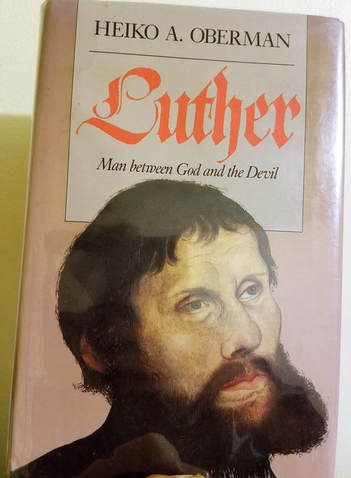Five hundred years ago today (Oct. 31, 1517), Luther the young monk, Luther the German dissident nobody, walked a short distance to the town center and nailed a document he’d been working on to the door of the main church. This was the church in a no-name town with a third-rate university (Wittenberg). His document called for a theological debate; he’d been mulling over the issues at hand for a few years; he was sure the authorities were wrong and equally sure there was a need for someone to take a stand. If not me, who? And the rest, as we like to say, is history.
How could it be? A country-bumpkin type, not one of the important people, someone who’d stumbled his way through early life, someone who seemed adrift and obsessed over his religious uncertainties. This character rises out of nowhere to confront and defeat the Church and the entire established order of Europe?
We have Luther the Devout Christian; Luther the Discoverer of Grace and thus Luther the Religious Revivalist. Ending it there cannot begin to capture what’s going on. We have Luther the Common Man (against the ‘Fatcat’ or the priestly elite caste); Luther the Uncompromising Crusader for Truth and Honest-Dealing (against the slick con-men types); Luther the Optimist (following his discovery of Grace); Luther the Intellectual and Scholar; Luther the Bombastic Propagandist; Luther the Country-Bumpkin and anti-Elitist (and yet his patron is the King of Saxony); Luther the flouter of early-16th-century Political Correctness is enjoyable to watch. We have a Luther whose immediate ancestors were Late-Medieval men yet Luther is not one, thus Luther the New Man, the Early Modern Man; the latter leads us to another enduring image, Luther the German (or perhaps Luther the Northern European); Luther the modern-style Patriot or proto-Nationalist is a sure extension from that. Lest anyone accuse him of being a proto-Prussian-militarist aligning to some kind of late 19th-to-eary-20th-century stereotype, we also have Luther the Pacifist who consistently refuses and denounces any armed struggle. Lest any of this seem too serious, we cannot miss Luther the Lover of Life (following his discovery of Grace, and following his marriage); and Luther the Joke-Teller, the Dry-Humorist.
But the Luther that most endures would seem to be Luther the crusading, righteous Dissident; the (Religio-)Political Insurgent. And what of politics? We have a Luther the Conservative coexisting with a Luther the Overturner of things Conservative’; Luther the abandoner of established, inherited, dominant orthodoxies that are not defensible. Tradition itself ipso facto is no justification for Luther, after all, if it means indifference and lazy acceptance or wrong or harmful ideas. Hence, after all, Luther the Reformer.
Usually, political anger is a flash in the pan and by its nature cannot sustain itself, or in some cases it is crushed by force. In other words, very few Luther-type figures ever achieve anything. He quickly became
The early days of mass printing allowed his writings to spread widely, quickly, cheaply and for him to become a symbol for the aspirations of millions. (I learned from the new Luther movie that 100% of his writings were 100% ‘pirated’ by early printers; he never received one cent of royalties for any of the millions of copies of his many writings; he didn’t mind.)
If words can be printed, so could pictures. Some of the pro-Reformation artwork that took off with the Luther movement is very clever and like nothing we see today. They must be among the earliest political cartoons. They range from “agitation propaganda,” to serious lionization of Luther and the reformers (“Luther’s Triumph“), to mockery, belittlement or demonization of the detractors (“papists”), to the satirical, like this:
I found this Reformation cartoon in a Luther biography I found at the library which I have tried reading during spare moments but failed to get through before the 500th has finally come:
I commemorated the great man in multiple ways, one of which you are now reading, i.e. my attempt to write something of some meaning on him that hasn’t already been said a hundred times (in this perhaps I have not succeeded; my insights on him cannot be said to be novel). There was also the new Luther movie in early October (I went with M. who was in town that week; a great time).
Another commemoration was a last-minute decision on Sunday October 29th (Reformation Sunday). I snuck in a visit to the Washington, D.C., National Cathedral, which, for the occasion, was full of thousands of Lutherans (and others, I presume). Every one of the thousands of seats was full and there were people crowding all along the sides and in the back, myself included. I have never seen so many Lutherans in one place. “Jubilant” is how I’d describe the atmosphere. As if a war had just been won. I’m glad I went, despite rainy/windy conditions and my having an exam in International Trade the next day.
Then there was the hugely successful Reformation Party / Luther Party at the church, some moments from which I include here:
A fitting tribute, one of countless thousands of tributes to 1517 across the world in 2017.
Oh! And the Luther impersonator. How can there be a Luther Party without a Luther impersonator?
Here he is. “Luther enters the building”:
Oh, and an “indulgence peddler” was also active before dinner, wandering around selling them in a big basket. I managed to procure one which gives me “Permission to not attend one meeting you really don’t want to attend.”
Among many others, told E.S., an Australian I know who is in Korea for the year, about the Luther party. E.S. was impressed and replied that if there is one thing the world needs more of, it is “more Luther impersonators.”





















